I was wondering how to check whether a variable is a class (not an instance!) or not.
I've tried to use the function isinstance(object, class_or_type_or_tuple) to do this, but I don't know what type a class would have.
For example, in the following code
class Foo:
pass
isinstance(Foo, **???**) # i want to make this return True.
I tried to substitute "class" with ???, but I realized that class is a keyword in python.
